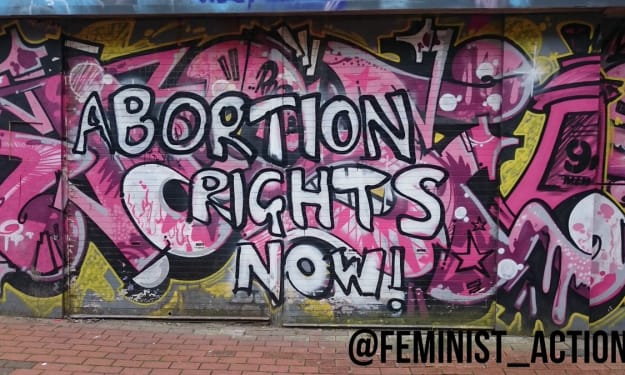On Punching Nazis
The question isn't whether we should or shouldn't, but how hard and how often.

Do you know when there's a fashionable idea going around, but there's something that feels a bit “off” with it? I spend a lot of time in skeptical and atheist circles, and there is always some real-world issue reduced to a vague abstraction, to be resolved with “logic.” Inevitably, the removal of any human element leads to a completely abhorrent solution, and yet the “rationalists” stand by it even when the consequences of their thought experiment are revealed in horrifying technicolor. This never-ending quest for simple, neat solutions completely ignores the fact that life is messy and does not lend itself to unambiguous certainties.
And so we are to tackle the dilemma of “is it right to punch Nazis?” The argument is rather limited and predictable, consisting of the following steps:
“Nazis are bad... but punching people is bad... therefore punching Nazis makes one a Nazi!”
Mmmm-hmmmm. I'm sure you can see some tiny cracks developing in the veneer of intellectual rigour before us. I am wondering if a part of this line of thinking is related to the impression that many of us have of neo-Nazis: violent skinheads with little acumen or education. Punching people is exactly the sort of thing they'd do! And who wants to be like them? But their latest incarnation isn't like the maladjusted thugs who get laughed off the streets at their anachronistic parades. These guys are young, well-educated, and respectable-looking. They themselves use the language of inquiry and debate and cleverly edge their way into mainstream society. They are more like Oswald Mosley's Blackshirts than Tommy Robinson's angry mob. Slowly, and stealthily, they used the cover of the centre-right to sneak in ideas that were more and more extreme. Aided by politicians like Farage in the UK and Trump in the US, these ideas became legitimate topics of political discussion, appealing to closet racists and disaffected white voters alike. And now we have fascists not just on the streets, but in government as well. When fascism becomes a mainstream ideology, punching its proponents is seen as disrespectful and anti-establishment.
So we must redress the balance, bring things back from the fringes of the far-right. But how should we do this? The urge to smack them Nazis square in the face is strong, but here is the rational voice of centrists to rein us back in. Phew, that was close! So we need to shift the discussion back to the centre, much like you'd expect from a centrist. It's a nice idea in theory, but the problem with the warm and fluffy centre of politics is that it plays by a different set of rules to outright fascism. Let's give them a chance, they say, let's hear them out. Maybe we could all learn something from the debate. Well, I have some bad news for the idealistic centre. Nazis are not interested in a gentleman's agreement, because they are not gentlemen. They're fucking fascists! They want nothing but complete and utter totalitarianism! We attempted this tactic in 1939. It did not end well.
And this is around the time, here it comes, there we are — right on cue! “What about Free Speech! Aren't we just as bad by suppressing Nazis?” Well, my logical friend, let me introduce you to the concept of False Equivalence. See, the belief in an Aryan master race, and the extermination of lesser peoples, doesn't really compare with the notion that we should maybe prevent genocide if at all possible. Seeing as the discussion has developed a skeptical bent, let us call upon the wisdom of Karl Popper and the Paradox of Tolerance: if a society is tolerant without limit, the ability to be tolerant will eventually be seized or destroyed by the intolerant. And who might be the intolerant party to not be tolerated? That's right! It's those damned Nazis again! Is there nothing they won't stop at? Well, no. They're goddamn Nazis! If we respect their Free Speech, they will do everything in their power to destroy ours. They've got form on this one, people! Under the Third Reich, the Nazis ruthlessly suppressed any dissenting viewpoints in the media, and even in private communications. A breach of their censorship rules could be punishable by death. The Nazis were not the strongest proponents of Free Speech, to put it mildly. If we extended that courtesy to them, they would use it to entrap us and then take it away. There is no debate to be had with tyrants.
An interesting observation from similarly one-sided discussions: ordinary people often don't expect to be arguing against extreme views, because no-one would ordinarily mention such outrageous ideas. They catch us off-guard, and we don't know how to respond. And if respectable voices then join the discussion, giving fascists the benefit of the doubt and the opportunity to speak, it lends credibility to their views, and steers the centre-ground further to the right. These respectable individuals have a power they may not be fully aware of: they are admired by many, and they influence the beliefs of their fans. Even if ordinary people disagree, it can be intimidating arguing against the tide of popular opinion. With the left-wing fading into obscurity, or labelled as extremists themselves, there is no one to drag things back to the middle. Faced with only differing degrees of right-wing policies, the people are forced into tacitly approving the political Right.
Back to 1939. The year before, Neville Chamberlain famously met with Adolf Hitler to negotiate for peace. While we look back upon Chamberlain unfavourably, and as a minister with no spine, his appeasement policy was popular with the electorate, who did not want another war, and it was strategically wise, as Britain's military was not prepared for battle with Germany. Some difficult concessions were made, and Chamberlain returned from Munich declaring that he had ensured Peace For Our Time. A victory for respectful dialogue? Nope. Over the following year, Hitler reneged on everything he'd promised and ultimately invaded Poland in September 1939. This time, Chamberlain was having none of it, and war was declared on Germany. The Nazis proved themselves to be untrustworthy, and Chamberlain responded swiftly (many people think it was Winston Churchill that declared war, but this is untrue. He did lead Britain through most of the war years, but he didn't actually become Prime Minister until May 1940, a full eight months into WWII). Think of it as a metaphorical punch to Hitler's face.
Prior to the war, and until it ended, certain groups in Nazi Germany — how shall we put it — did not have a great time. If you were Jewish, a gypsy, disabled, LGBT, an intellectual, or just generally had a big mouth, you were on the Nazis Shit List (that's right, geniuses, you will be first against the wall). And sure, I may be a little facetious at times in this article, but the consequences of the rise in Nazism were dire for many millions of people. Remember that the Nazis' main goal was to promote an Aryan master race. Other people were seen as subhuman. There was no room for diversity, or freedom of thought or expression. Being different, or standing out, was one of the most dangerous things in Nazi Germany — punishable by death. The degree of control and monitoring of the population was extreme, and nobody wanted to step out of line. This further enabled the Nazis to carry out even more abuse and murder, as the people did not have any power to oppose their government's actions due to the repressiveness of the regime, and even if one did not agree with the Nazi's policies (sadly, many did), standing up for other citizens would have guaranteed the same fate as those one was trying to protect. By the time fascism had completely taken over Germany, it was too late to do anything to curtail it. As Martin Niemoeller wrote:
“Then they came for me—and there was no one left to speak for me.”
And what of those that we should speak up for? Their right to exist is at stake. Framing the matter as an intellectual game of “what ifs” is dangerous. We already have extreme right-wing views seeping into the mainstream, and based on recent history, we know that it is a few tiny steps from justifying murder on the industrial scale. To hear discussions of the possible merits of Nazism is chilling; legitimising the most extreme politics in the name of free speech is an abuse of the freedoms we all have to live as we please. Because it would not just be scapegoated minorities affected — fascism harms the freedom and rights of everyone. But the privileged majority may not realise until it's their turn.
We must stop fascism before it is too late. This isn't a hypothetical argument or in any way equivalent to the academic posturing of the Freeze Peach Brigade. We have seen, within living memory, the consequences of extreme right-wing politics. We can no longer pretend that we have solved all the world's problems and that it could never happen to us. Hitler rose to power in a time of economic and political ruin, and gave the people what they wanted. He rebuilt the economy, created jobs and made Germany great again. He also provided targets for the people's anger and frustrations, and suppressed all opposition, allowing him to go unchallenged and to completely dominate the lives of German citizens. The trains may run on time, but that's no good if one cannot leave one's home for fear of arrest.
But can we justify violence in our civilised society? We have plenty of evidence that debate does not work against those who will not engage, or who do so in order to deceive. That option is no longer available. Karl Popper also considered this eventuality:
“I do not imply, for instance, that we should always suppress the utterance of intolerant philosophies; as long as we can counter them by rational argument and keep them in check by public opinion, suppression would certainly be unwise. But we should claim the right to suppress them if necessary even by force; for it may easily turn out that they are not prepared to meet us on the level of rational argument, but begin by denouncing all argument; they may forbid their followers to listen to rational argument, because it is deceptive, and teach them to answer arguments by the use of their fists or pistols. We should therefore claim, in the name of tolerance, the right not to tolerate the intolerant.”
We have tolerated the intolerant for too long. We have Nazis on the streets, and yet there are those defending their right to express their political opinion. Expressing one's opinion is what one does in the debating chamber, or down the pub. It does not extend as far as marching with burning torches and saluting Der Fuhrer. We gave them a platform for their ideas, and it has emboldened them. We can appeal to the fascists for a civilised discussion, but that's not what we will get. They would obscure, lie, oppress, and ultimately attack us, and our offer to them is the signal that we are weak and unprepared. They would walk all over us and destroy us by manipulating our good nature. And so, violence is the only effective tool we have left. In 1939, we gave Hitler a chance, and we quickly learnt that words were wasted on him. We have the opportunity to stop history repeating itself, and we may have to do some uncomfortable things as part of that. We need to shut it down. Yes, it is bad and illegal to punch someone, but it is also immoral to allow the spread of ideologies that threaten the lives of others. Ultimately, you, the individual, make the choice whether or not to punch that Nazi. But collectively, we should tolerate intolerance no more. We must create an environment in which it is completely unacceptable to promote extreme right-wing ideas. And if that means punching a few Nazis, then I'm all for it.
About the Creator
Katy Preen
Research scientist, author & artist based in Manchester, UK. Strident feminist, SJW, proudly working-class.






Comments
There are no comments for this story
Be the first to respond and start the conversation.